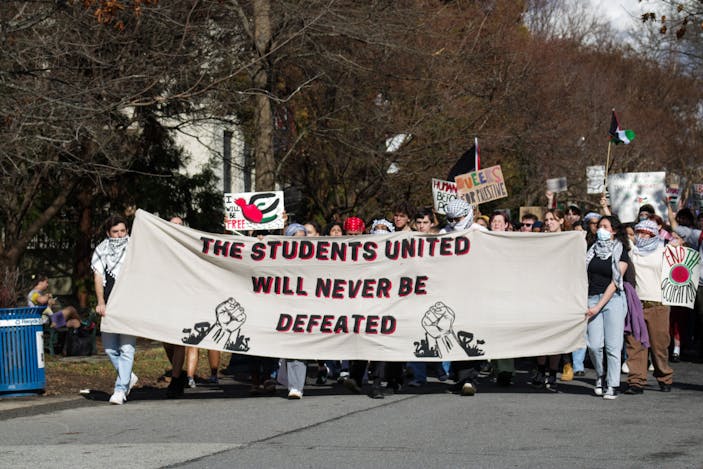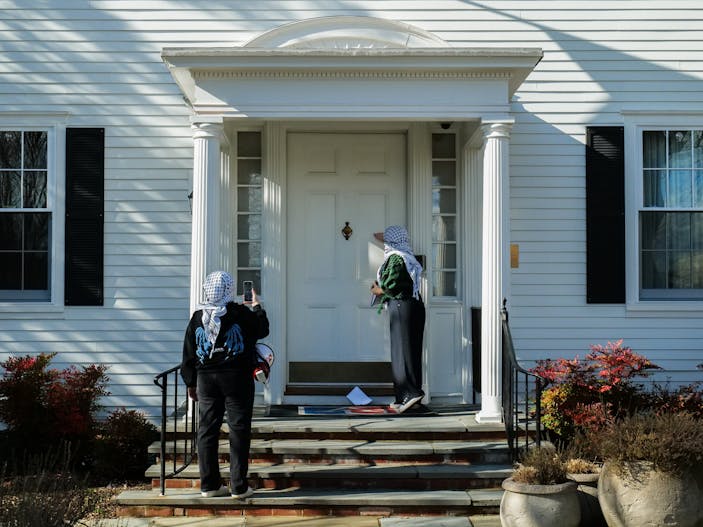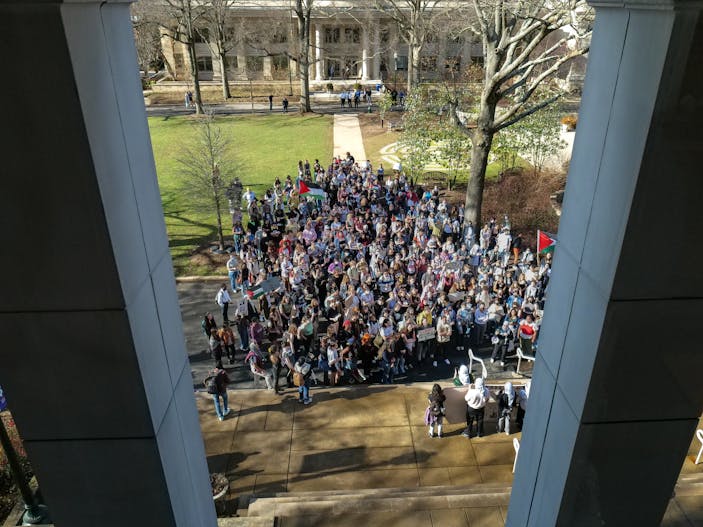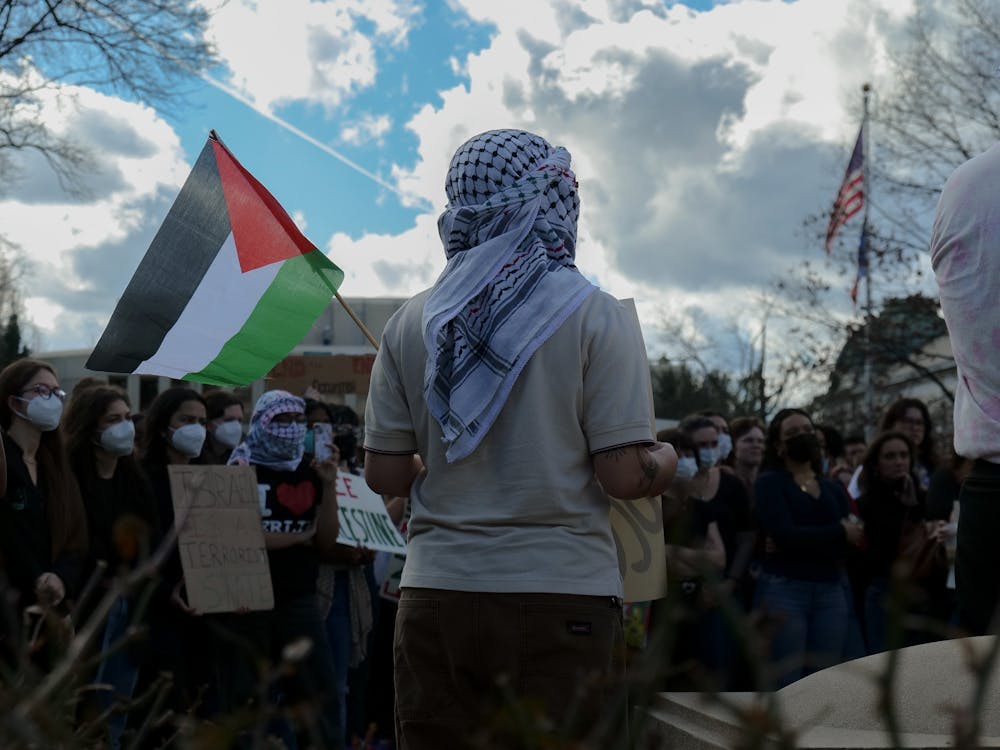The American University chapter of Students for Justice in Palestine organized its largest demonstration on Jan. 26, with an estimated near 300 attendees. At the protest, dubbed “American U End the Genocide,” protesters from the organization delivered a letter to the President's Building doorstep.
The protest, which began on the quad, marked the fourth demonstration for Palestine at the University since Oct. 7 and the announcement of the AU Palestine Solidarity Coalition, a group of over 25 student organizations dedicated to supporting Palestinian causes on campus, according to the coalition’s Instagram.
AU SJP said their letter demands AU administrators’ support of Palestinian students and protection of campus free speech.
Speeches from organizers condemned the University’s lack of response to the 26,000 people who have been killed and more than 64,000 wounded in Gaza since Oct. 7 and failure to support Palestinian students.
Attendees heard from members of AU SJP, AU Jewish Voice for Peace, the Washington College of Law’s chapter of SJP and the AU Black Student Union, who spoke in support of Palestine and said student voices were important to the cause.
“We organized this walkout today to remind the campus that Gaza is still facing genocide, and pressure AU’s administration to take real steps to support all of their student body,” AU SJP wrote in a statement to The Eagle. “This administration has not shown any support or empathy with their Palestinian students, faculty, and staff which is why today we came together to collectively tell this administration that we deserve to be heard, to be seen, and to be treated as equals.”
Matthew Bennett, the University’s chief communications officer, said the University is committed to supporting students’ sense of belonging and addressing their concerns.
“We have talked about and communicated about the harm of Islamophobia throughout the fall,” Bennett told The Eagle in a Zoom interview. “Our teams and leaders are engaging with student organizations representing Palestinian, Muslim and Arab communities on a regular basis.”
After a series of speeches on the quad, organizers led the march to the President’s Building.

‘Shame, shame, shame on you’
Once at the President’s Building, speakers noted that this was the second time they gathered outside the building asking for support, referencing a previous protest on Nov. 1. Speakers condemned Burwell’s Jan. 25 email, in which new policies banned protests inside University buildings and required that any University-sponsored events and posters must “promote inclusivity.”
The speakers called the policies an attempt to suppress Palestinian students’ speech.
“We are in solidarity not only with Palestine, but with our coalition which is being threatened and suppressed by an administration which claims to create ‘changemakers’ and value ‘Inclusive Excellence,’” AU SJP wrote in their statement. “At the same time, they are demonizing diverse views on campus which don’t align with the politics of their donors. The new policies they have announced not only target SJP, but all of student speech and thought at AU.”
Protesters chanted “shame” after each criticism of the email and University administration and cheered at speakers’ calls for students to continue to use their voices in the face of what they called administrative inaction.
Bennett said these new guidelines aim to clarify existing policies that allow the University to regulate the time, place and manner of protest, and noted that the guidelines will be reviewed at the end of the semester.
“The actions that were implemented last Thursday — they reinforce the responsibilities that all the community members have under the Freedom of Expression policy and statement of values,” Bennett said. “Those policies haven't changed. That's a really important part. They, in fact, actually support free expression. They don't suppress it.”
The email that announced the policy said the University was “implementing immediate actions for the spring semester.”
Speakers also said the six other University emails regarding tensions on campus over the Israel-Hamas war since Oct. 7 did not adequately support Palestinian students. They called on the University to protect Palestinian students on campus, saying administrators had failed in their jobs to keep all students safe.
Haider Zaidi, a freshman in the School of Public Affairs who attended the protest, said he hopes the University repeals these policies: “The basis of a protest is disruption.”
“I think it's actually really atrocious that our school stands with Zionism, which is a terrorist entity and they continue to back the agenda without offering any support to the Palestinian and Muslim students, regardless of the fact that the Zionist belief is inherently anti-Islamic and is inherently based in racism, white supremacy and xenophobia,” Zaidi told The Eagle. “We have restrictions on what type of free speech we can have on campus.”
Bennett said student safety and wellbeing on campus is the University’s top priority and that AU administrators must focus on the AU community rather than world affairs.
“We understand that members of the community have strong views on international issues and events, issues of ceasefire and government policy in the Middle East,” Bennett said. “Those are outside of American University's scope and mission. We can't control such matters, but what we can do is continue to listen to one another, continue to find ways to constructively engage with one another.”
Letter to Burwell

After more speeches, two members of AU SJP walked up to the President’s Building’s front door to deliver a letter that demanded “immediate action” to protect AU students.
“The letter was essentially telling Sylvia Burwell that her lack of support and protection of Palestinians on campus, as well as the attempted suppression of our speech is unacceptable and we will not tolerate it,” AU SJP told The Eagle in an email. “We wrote about how her lack of action and urgency towards protecting Palestinian students, staff, and faculty is what enables and emboldens these acts of hate on campus to thrive which [she] and her administration are solely responsible and at fault for the acts of hate that happen towards the Palestinians on campus.”
AU SJP said Burwell should support Palestinian students instead of creating policies that limit students’ rights to protest on campus.
“The purpose of this letter is to have President Burwell take immediate action to protect her students, instead of demonize and try to silence them while standing up for human rights and protesting against genocide and ethnic cleansing,” AU SJP wrote.
AU SJP also posted a statement on their Instagram Sunday in response to Burwell’s Jan. 25 email, which was co-signed by 16 other student organizations at AU including Jewish Voice for Peace, the Muslim Student Association and the South Asian Student Association.
“AU’s decision to remain silent about the rise of anti-Palestinian hate crimes across the United States, while actively smearing our own efforts as antisemitic, is in line with leadership’s consistent failure to protect Palestinian students on campus,” the statement read. “While SJP members have repeatedly expressed to various university administrators the forms of unsafety we experience, through doxxing, racist and vile harassment, or defamatory language, our concerns time and time again have been met with additional policies that further marginalize and put us at risk.”
The statement also addressed Burwell’s “concern about inclusivity in student organizations” from her email.
“The AU Palestine Solidarity Coalition, formed with over 25 diverse student organizations, embodies a real and living commitment to inclusivity as we understand clearly that our struggles are interconnected,” the statement read.
‘Divestment now’
Speakers called on Burwell to break the University’s ties to Tel Aviv University in Israel and end funding to Israel, chanting “divestment now” and “students, students don’t be blind, AU’s funding genocide.” The University partners with Tel Aviv University for a two-way student exchange program and AU’s Center for Israel Studies, which was established in 1998, was the first of its kind in the United States. AU was also the first university to offer a minor in Israel Studies and the first administrative home of the Association for Israel Studies.
“As long as Zionist money keeps coming in, our University’s going to keep funding Zionism, so it's also important to divest from the Tel Aviv University,” Zaidi said. “Supporting a Zionist state in any capacity is inherently pro-genocide.”
Bennett said the University has partnered with more than 160 international institutions and 84 academic exchange agreements, including with Tel Aviv University, which is for academic purposes.
Zaidi added that some AU board members hold seats in defense companies, and the University partners with companies including Deloitte and Raytheon. The Kogod Cybersecurity Governance Center is sponsored by The Raytheon Company, which has provided weapons to the Israeli military.
AU students also partnered with a team of facilitators from Deloitte through the Future of Work Institute, according to AU’s website.
In January 2021, Wesley Bush was appointed to the University’s Board of Trustees after serving as the chairman and chief executive of Northrop Grumman, one of the world’s largest weapons manufacturers and military technology providers, until 2019. Northrop Grumman manufactures multiple weapons systems used by the Israeli military, per the American Friends Service Committee.
“A lot of our board … [is] complicit with the genocide because they have investments in war companies, and as long as there’s a conflict of interest, they can’t truly offer us fair and just education and they can’t offer us an environment to prosper,” Zaidi said. “Rather, they're only going to do what's best for them, what's best for their money.”
Bennett said these board members’ positions on other boards do not affect their work or contributions to the University.
“Their participation on other boards does not affect American University, just as their presence on our board doesn't affect other boards that they are on,” Bennett said.
Bennett added that, although AU works with outside companies, the University does not contribute to those companies’ military operations and has no financial ties to the Israeli government or military.
“While we might have educational partnerships or grant engagements with a variety of companies, including some companies that have defense-related businesses, we don't have any involvement or connections with those companies' operations in military matters,” Bennett said. “How a company that engages with the Department of Defense or the military, that doesn't involve us in any way, shape or form.”

Organizers then led the crowd to the front of Kerwin Hall to conclude the walkout with more chants and speeches, again echoing calls to divest from Israel.
Eugenie Rose Belony, a freshman in the College of Arts and Sciences who attended the protest, said she is a long-time activist for a number of issues.
“I think just showing solidarity is one of the most important things the same way [as] if it was a Black Lives Matter protest or the #MeToo movement, where we all show solidarity for each other,” Belony said after the protest. “I think that one of the most important things is to show up.”
Zaidi said he showed up because this issue should be important to everyone. “It’s important for anybody to stand against … any form of injustice or any form of atrocity especially when our administration and our money is going towards it.”
Bennett said AU students’ tuition dollars do not flow to outside companies that partner with the University. Instead, tuition goes toward supporting work at AU.
Belony added that the University should foster a welcoming environment for prospective students touring AU and urged University officials to address students’ concerns.
“I think it's just listening to your students, like we've done so many things — emailing, phone banking, protesting, leaving letters — all these things that students are trying to communicate with admin,” Belony said. “We’re not saying ‘Change everything in the entire world.’ There are some things that we’ve [asked] ‘Can you address this and not just push this to the side … and [act] as if there’s nothing happening?’”
This article was edited by Tyler Davis, Abigail Turner and Abigail Pritchard. Copy editing done by Luna Jinks, Isabelle Kravis and Sarah Clayton.





